Global Antibody Purification Service Market - Comprehensive Data-Driven Market Analysis & Strategic Outlook
The global antibody purification service market will break free from its current constraints as the pharmaceutical and biotechnology sectors keep pushing the innovation envelope. With greater focus on precision medicine and biologics development, this market will soon be a critical support system for organizations engaged in increasing the quality and safety of therapeutic antibodies. Rather than being confined to conventional laboratory testing, it will extend to comprehensive solutions that combine automation, artificial intelligence, and sophisticated chromatography methods to provide increased purity and reproducibility.
- Global antibody purification service market valued at approximately USD 2891.8 million in 2025, growing at a CAGR of around 7.5% through 2032, with potential to exceed USD 4799.5 million.
- Physiochemical Fractionation account for nearly 15.1% market revenues, driving innovation and expanding applications through intense research.
- Key trends driving growth: Rising demand for monoclonal antibodies in therapeutic and diagnostic applications., Growing biopharmaceutical R&D investments boosting need for high-purity antibodies.
- Opportunities include Advancements in automated and high-throughput purification systems create efficiency gains.
- Key insight: The market is set to grow exponentially in value over the next decade, highlighting significant growth opportunities.
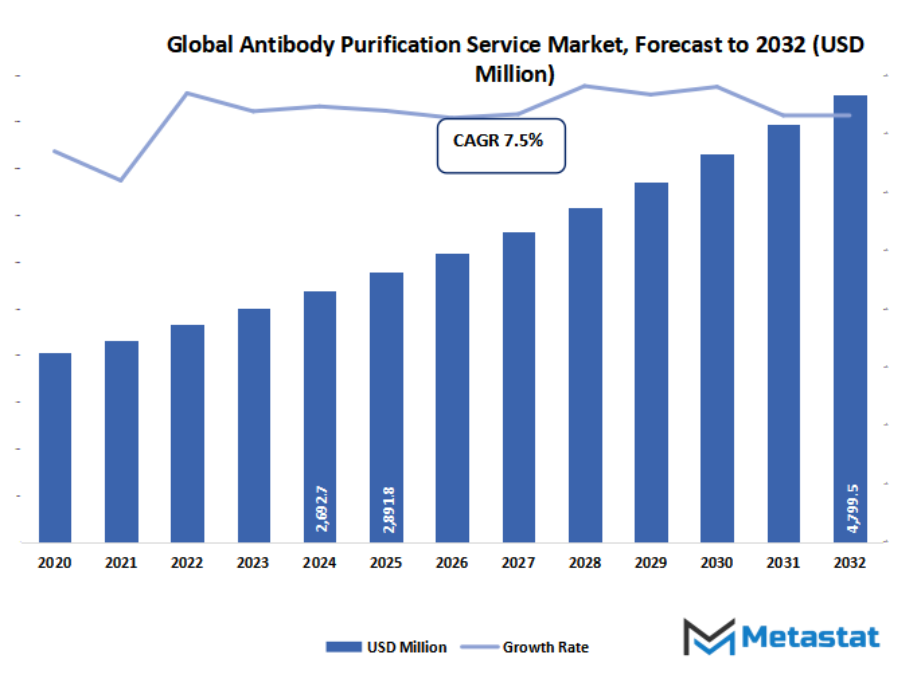
How will emerging biopharmaceutical innovations reshape the call for antibody purification services within the coming years, and could automation redefine traditional purification workflows? As personalised medicinal drug gains traction, will carrier carriers be capable of preserve pace with the developing complexity of antibody structures and purity requirements? And amidst fast technological development, how would possibly international regulatory variations affect the scalability and competitiveness of this evolving market?
With the scientific network challenging the boundaries of antibody engineering similarly, purification offerings will now not be appeared as a distinct step in production however as an incorporated procedure that guarantees the success of drug improvement. New approaches will offer faster turnaround times and better scalability, enabling researchers to streamline the technique from discovery to medical checking out. Service companies will need to pay attention on growing tailor-made purification techniques according to the individual molecular profiles of new antibodies.
In addition, the global antibody purification service market will begin to take a pivotal role in backing global healthcare efforts. As more healing antibodies move into the pipeline, demand will reach past studies centers to involve biomanufacturing centers, diagnostic developers, and contract research businesses. Collaborations among those industries will create a greater harmonious putting, assuring uniform first-class standards worldwide.
Market Segmentation Analysis
The global antibody purification service market is mainly classified based on Type, Application.
By Type is further segmented into:
- Physiochemical Fractionation - The global antibody purification service market will see enhancements in physiochemical fractionation techniques with automation and precision-based purification systems becoming increasingly famous. The approach will be stronger through better chromatography and filtration generation, enabling greater purity and yield. Innovations inside the future will be directed at minimizing impurities, shortening processing time, and maximizing antibody healing for therapeutic and diagnostic applications.
- Class-Specific Affinity - The global antibody purification service market will witness robust growth in class-precise affinity purification due to growing uses in targeted therapeutics. Future structures will be more selective with the capability to differentiate among antibody subclasses extra correctly. New technology will provide the ability for scalability, permitting excessive and steady-pleasant antibody separation wished for biopharmaceutical manufacturing and studies research.
- Antigen-Specific Affinity - The global antibody purification service market will develop as antigen-unique affinity purification turns into important in the production of antibodies with precise binding specifications. The technique will become more prominent in vaccine research and customized medicine. Future techniques will incorporate intelligent resins and automated affinity platforms that allow exact isolation of high-affinity antibodies with minimal waste and maximum activity preservation.
By Application the market is divided into:
- Monoclonal Antibodies - The global antibody purification service market will be in large part fueled with the aid of increasing utilization of monoclonal antibodies for healing and diagnostic functions. Growth in demand for biologics will urge carrier providers to enforce non-stop processing structures. Future methodologies will focus on cost-efficient purification, excessive throughput, and lower risk of contamination to meet huge-scale scientific manufacturing requirements.
- Polyclonal Antibodies - The global antibody purification service market will hold growing with the increasing use of polyclonal antibodies in immunoassays, toxin detection, and infectious ailment studies. Future purification technology will consciousness on accuracy and reproducibility and mitigate issues related to variability. Increased purification techniques will facilitate antibody variety and balance to supply steady performance in biomedical studies and enterprise.
|
Forecast Period |
2025-2032 |
|
Market Size in 2025 |
$2891.8 Million |
|
Market Size by 2032 |
$4799.5 Million |
|
Growth Rate from 2025 to 2032 |
7.5% |
|
Base Year |
2024 |
|
Regions Covered |
North America, Europe, Asia-Pacific, South America, Middle East & Africa |
Geographic Dynamics
Based on geography, the global antibody purification service market is divided into North America, Europe, Asia-Pacific, South America, and Middle East & Africa. North America is further divided in the U.S., Canada, and Mexico, whereas Europe consists of the UK, Germany, France, Italy, and Rest of Europe. Asia-Pacific is segmented into India, China, Japan, South Korea, and Rest of Asia-Pacific. The South America region includes Brazil, Argentina, and the Rest of South America, while the Middle East & Africa is categorized into GCC Countries, Egypt, South Africa, and Rest of Middle East & Africa.
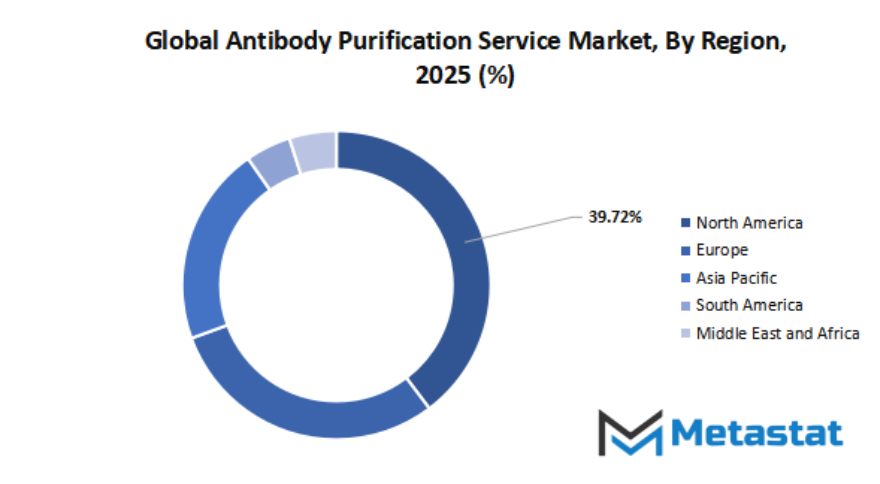
Competitive Landscape & Strategic Insights
The global antibody purification service market is receiving notable interest because the requirement for brilliant antibodies maintains growing in pharmaceutical, biotechnology, and studies industries. Purification of antibodies is vital for assuring the efficacy and precision of diagnostic and therapeutic uses. As immunology and molecular biology studies grows, the demand for pure and constant antibodies will hold increasing. This enlargement is spurred mainly by using the developing occurrence of chronic situations, the evolution of focused remedies, and the growing variety of biopharmaceutical research sports globally.
The zone boasts a numerous range of nicely-mounted international gamers and promising regional organizations aimed toward presenting cutting-edge purification offerings. Abcam, Agilent Technologies, Bio-Rad Laboratories, and Thermo Fisher Scientific are some of the agencies that have installed themselves as strong players inside the industry by using supplying top notch services and products which might be held to rigorous research and medical requirements. Their technical know-how and innovations enable powerful purification methods that decorate antibody yield and purity, that are vital for studies and remedy success. New players also are making their presence felt with the aid of supplying less costly and tailor-made purification answers primarily based on individual consumer requirements.
In this aggressive landscape, innovation will remain a core emphasis. Companies along with Merck KGaA, GenScript, and Cytiva are closely investing in automation, chromatography structures, and resin studies to maximize purification accuracy and scalability. The application of such sophisticated methods as protein A affinity chromatography and ion-exchange processes means that scientists can purify antibodies with little loss of activity. These technologies will not only speed up purification but also ensure that it is more uniform, and thus laboratories can produce more to address the increasing worldwide demand for biologics.
Industry players and research institutions are further consolidating this market through collaboration. Hoffmann-La Roche, Invitrogen, and Hycult Biotech are some of the agencies leading the manner with the aid of making strategic alliances with academic labs and biotech corporations to drive innovation in antibody purification technologies. These alliances provide the bridging among experimental studies and commercial makes use of in order that new techniques of purification may be successfully scaled up to commercial stages.
In the future, the global antibody purification service market will maintain developing as biotechnology evolves and healthcare structures increasingly contain antibody-based cures. With firms such as Sigma-Aldrich, Genway Biotech, and Creative Biolabs continuously investing in research and method development, the marketplace will trend toward better accuracy, improved performance, and wider availability. This increased opposition and innovation will assure that antibody purification remains a critical part of the design of next-generation remedies and diagnostic solutions globally.
Market Risks & Opportunities
Restraints & Challenges:
- Difficulty and expense of purification technologies slow small-scale up-take. The global antibody purification service market will continue to be challenged by means of the high costs of investment in state-of-the-art purification facilities. The technology is high-upkeep, requiring know-how, specialized centers, and excessive working prices, which poses boundaries for small research labs or institutions to enforce those services optimally. With prices nonetheless high, the market will no longer enjoy plenty access from new gamers, and even boom or innovation is probably limited in the near term.
- Tough regulatory standards hinder service scalability. The global antibody purification service market will also face constraints with the long regulatory approvals to validate and meet services. Each purification process will have to adhere to high quality and safety standards, which results in delayed approval periods. Such a process retards scalability, especially for entities looking to scale globally. The regulatory environment will persistently require careful documentation and validation, potentially hindering time-to-market and adding total costs, thus limiting growth prospects.
Opportunities:
- Advances in automated and high-throughput purification systems bring about efficiency benefits. The global antibody purification service market will be enormously preferred with the aid of advances in automation and excessive-throughput purification technologies. These technology will lower guide intervention, lower human error, and increase procedure pace, enabling the purification of greater volume of antibodies inside a shorter time period. With growing generation, provider carriers can have the capability to offer faster, extra dependable, and cheaper answers, improving access and efficiency for each commercial and scholarly uses. This development will enhance research ability worldwide and enable new opportunities for therapeutic antibody creation in the years to come.
Forecast & Future Outlook
- Short-Term (1–2 Years): Recovery from COVID-19 disruptions with renewed testing demand as healthcare providers emphasize metabolic risk monitoring.
- Mid-Term (3–5 Years): Greater automation and multiplex assay adoption improve throughput and cost efficiency, increasing clinical adoption.
- Long-Term (6–10 Years): Potential integration into routine metabolic screening programs globally, supported by replacement of conventional tests with advanced biomarker panels.
Market size is forecast to rise from USD 2891.8 million in 2025 to over USD 4799.5 million by 2032. Antibody Purification Service will maintain dominance but face growing competition from emerging formats.
With regulatory demands becoming increasingly stringent and therapeutic uses expanding, this market will redefine its role by marrying scientific accuracy with industrial scale. Future years will not only see innovations in purification technologies but also the creation of better global connections that embrace quality, efficiency, and reliability as core values in antibody development and manufacture.
Report Coverage
This research report categorizes the global antibody purification service market based on various segments and regions, forecasts revenue growth, and analyzes trends in each submarket. The report analyses the key growth drivers, opportunities, and challenges influencing the global antibody purification service market. Recent market developments and competitive strategies such as expansion, type launch, development, partnership, merger, and acquisition have been included to draw the competitive landscape in the market. The report strategically identifies and profiles the key market players and analyses their core competencies in each sub-segment of the global antibody purification service market.
Antibody Purification Service Market Key Segments:
By Type
- Physiochemical Fractionation
- Class-Specific Affinity
- Antigen-Specific Affinity
By Application
- Monoclonal Antibodies
- Polyclonal Antibodies
Key Global Antibody Purification Service Industry Players
- Abcam
- Agilent Technologies
- BioRad Laboratorie
- Creative Biolabs
- Cytiva
- FabUSA
- GE Healthcare
- GenScript
- Genway Biotech
- HoffmannLa Roche
- Hycult Biotech
- Invitrogen
- Merck KGaA
- SigmaAldrich
- Thermo Fisher Scientific
WHAT REPORT PROVIDES
- Full in-depth analysis of the parent Industry
- Important changes in market and its dynamics
- Segmentation details of the market
- Former, on-going, and projected market analysis in terms of volume and value
- Assessment of niche industry developments
- Market share analysis
- Key strategies of major players
- Emerging segments and regional growth potential



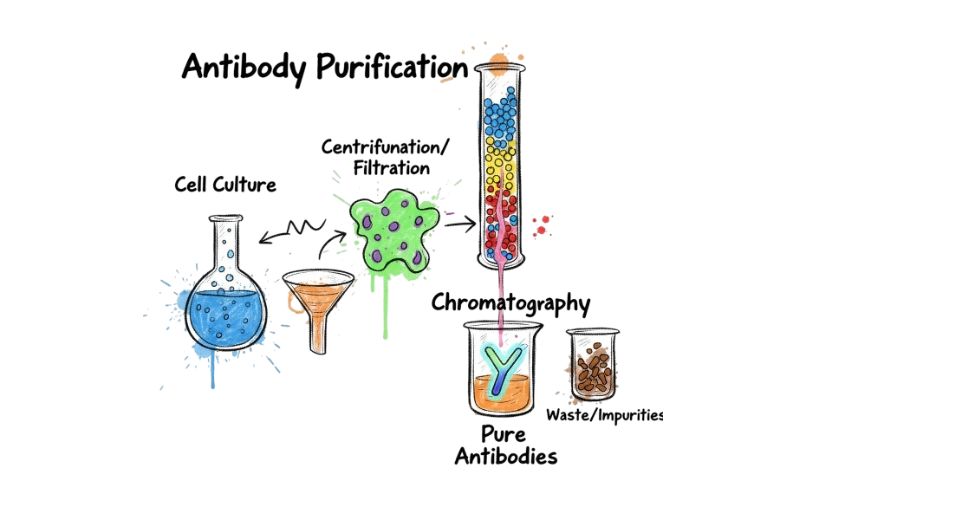
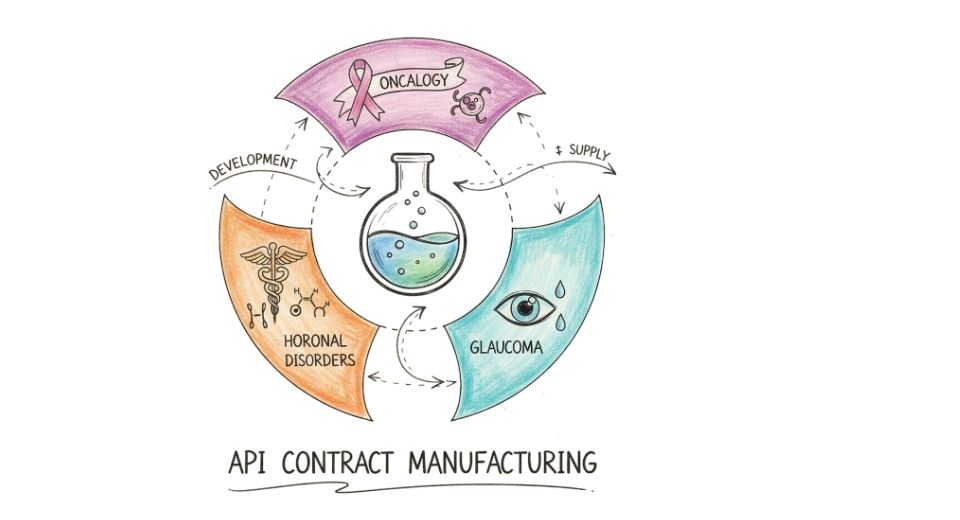
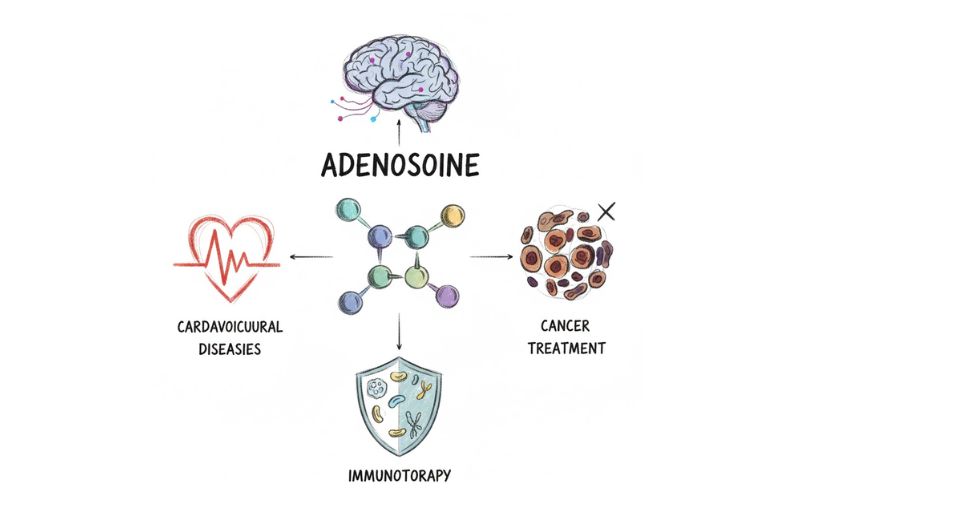
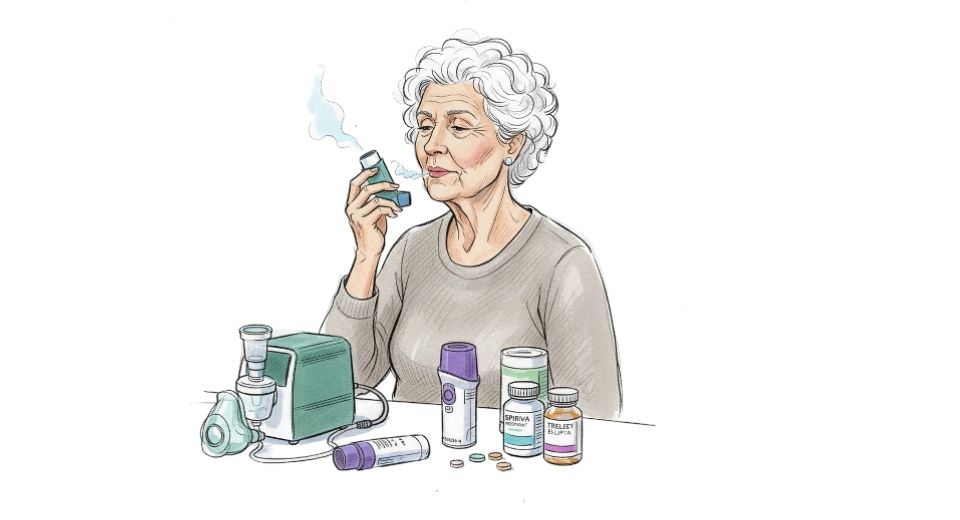

 US: +1 3023308252
US: +1 3023308252






